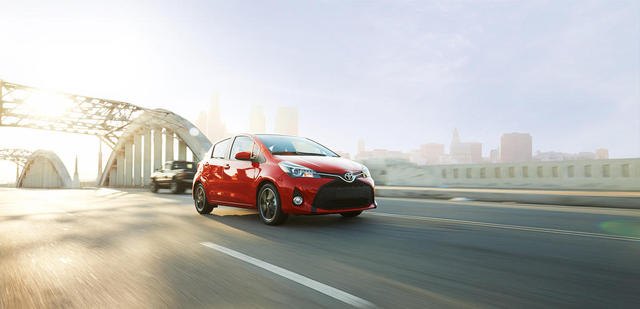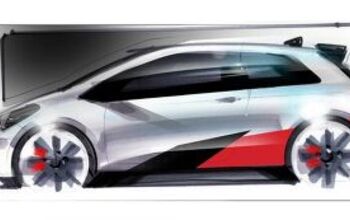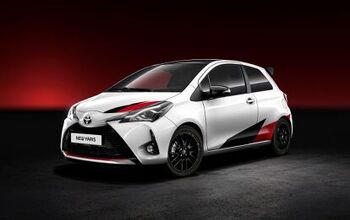Toyota Mulling a Hot Hatch, But Is the Yaris the Right Choice?

Toyota doesn’t immediately spring to mind when a buyer thinks of driving excitement. Far from it, in fact.
While the brand carries an enviable reputation of reliability, strong resale value and general popularity, it suffers in the performance and youthful appeal department. That could change, with Auto Express reporting that Toyota could build on its return to the World Rally Championship with a production hot hatch.
Volkswagen Golf R, Honda Civic Type R, Ford Focus RS…Toyota Yaris?
Toyota wasn’t always lacking in performance appeal. The 1980s Corolla GT-S and Celicas of various decades looked good and injected a shot of low-cost adrenaline into a staid lineup. True, the brand still has the 86 (formerly the Scion FR-S), but a rear-drive 2+2 with a naturally aspirated four-cylinder carries limited appeal, and sales show it.
A souped-up variant of the oh-so-economical Yaris is the brand’s entry into the WRC, a motorsports competition Toyota sat out for the past 17 years. Stripping off its sensible shoes, the WRC Yaris sports a turbocharged 1.6-liter four-cylinder making north of 300 horsepower. That output kicks mountains of sand into the face of the stock Yaris.
In hatchback guise (not the Mazda 2-turned- Yaris iA sedan) the Yaris makes 106 hp and 103 lb-ft of torque from its 1.5-liter four. The model could benefit from some muscle, says Toyota’s European president and CEO.
“It’s no use doing motorsport if you can’t reflect it in your product,” Johan van Zyl told Auto Express. “What you’ll see is that we want to totally integrate it into our offering.
The next-generation Yaris hatch won’t appear for at least another couple of years. Still, the automaker has engines in development — namely a 1.5-liter turbo making about 180 hp — that could one day find a home in the little subcompact. van Zyl spoke for Toyota of Europe, but a hotter Yaris — if built — could help the automaker challenge hot hatch competitors in North America.
Performance-minded compacts and subcompacts are on the upswing. The Hyundai Elantra Sport appears this fall. Hell, even Nissan is getting a foot in the door with its upcoming Sentra SR Turbo. Still, is the Yaris worthy of a hot hatch, or would the model’s name, so long associated with a tepid commuter car, hamper interest?
Toyota’s potential hot hatch competitors enjoy plenty of name recognition and heritage. Perhaps when the next-generation model bows, Toyota should consider a name change.

More by Steph Willems
Latest Car Reviews
Read moreLatest Product Reviews
Read moreRecent Comments
- W Conrad I'm not afraid of them, but they aren't needed for everyone or everywhere. Long haul and highway driving sure, but in the city, nope.
- Jalop1991 In a manner similar to PHEV being the correct answer, I declare RPVs to be the correct answer here.We're doing it with certain aircraft; why not with cars on the ground, using hardware and tools like Telsa's "FSD" or GM's "SuperCruise" as the base?Take the local Uber driver out of the car, and put him in a professional centralized environment from where he drives me around. The system and the individual car can have awareness as well as gates, but he's responsible for the driving.Put the tech into my car, and let me buy it as needed. I need someone else to drive me home; hit the button and voila, I've hired a driver for the moment. I don't want to drive 11 hours to my vacation spot; hire the remote pilot for that. When I get there, I have my car and he's still at his normal location, piloting cars for other people.The system would allow for driver rest period, like what's required for truckers, so I might end up with multiple people driving me to the coast. I don't care. And they don't have to be physically with me, therefore they can be way cheaper.Charge taxi-type per-mile rates. For long drives, offer per-trip rates. Offer subscriptions, including miles/hours. Whatever.(And for grins, dress the remote pilots all as Johnnie.)Start this out with big rigs. Take the trucker away from the long haul driving, and let him be there for emergencies and the short haul parts of the trip.And in a manner similar to PHEVs being discredited, I fully expect to be razzed for this brilliant idea (not unlike how Alan Kay wasn't recognized until many many years later for his Dynabook vision).
- B-BodyBuick84 Not afraid of AV's as I highly doubt they will ever be %100 viable for our roads. Stop-and-go downtown city or rush hour highway traffic? I can see that, but otherwise there's simply too many variables. Bad weather conditions, faded road lines or markings, reflective surfaces with glare, etc. There's also the issue of cultural norms. About a decade ago there was actually an online test called 'The Morality Machine' one could do online where you were in control of an AV and choose what action to take when a crash was inevitable. I think something like 2.5 million people across the world participated? For example, do you hit and most likely kill the elderly couple strolling across the crosswalk or crash the vehicle into a cement barrier and almost certainly cause the death of the vehicle occupants? What if it's a parent and child? In N. America 98% of people choose to hit the elderly couple and save themselves while in Asia, the exact opposite happened where 98% choose to hit the parent and child. Why? Cultural differences. Asia puts a lot of emphasis on respecting their elderly while N. America has a culture of 'save/ protect the children'. Are these AV's going to respect that culture? Is a VW Jetta or Buick Envision AV going to have different programming depending on whether it's sold in Canada or Taiwan? how's that going to effect legislation and legal battles when a crash inevitibly does happen? These are the true barriers to mass AV adoption, and in the 10 years since that test came out, there has been zero answers or progress on this matter. So no, I'm not afraid of AV's simply because with the exception of a few specific situations, most avenues are going to prove to be a dead-end for automakers.
- Mike Bradley Autonomous cars were developed in Silicon Valley. For new products there, the standard business plan is to put a barely-functioning product on the market right away and wait for the early-adopter customers to find the flaws. That's exactly what's happened. Detroit's plan is pretty much the opposite, but Detroit isn't developing this product. That's why dealers, for instance, haven't been trained in the cars.
- Dartman https://apnews.com/article/artificial-intelligence-fighter-jets-air-force-6a1100c96a73ca9b7f41cbd6a2753fdaAutonomous/Ai is here now. The question is implementation and acceptance.


































Comments
Join the conversation
I too like the iM, but the 1.8 normally aspirated engine is a deal killer. Maybe by the time I sell my TDI back, Toyota will have come to their senses and offer it with a better engine.
Should be the iM/Auris getting that treatment, not the Yaris.